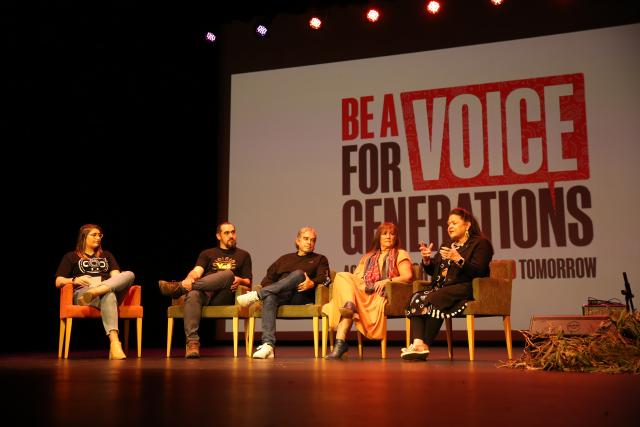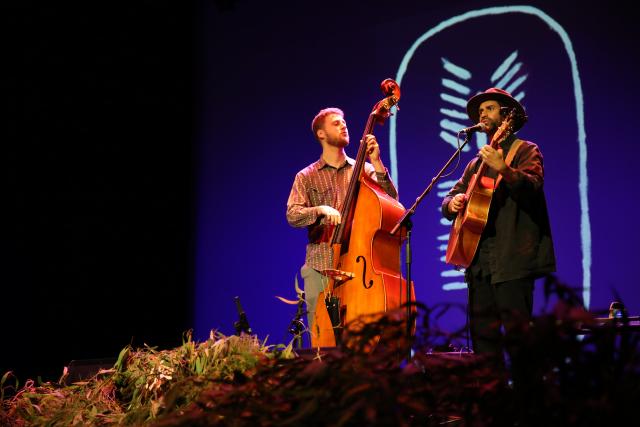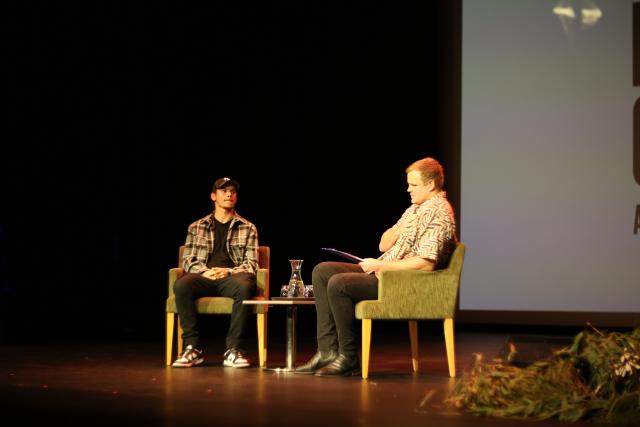
By Tanya Steele
Yarra Ranges Council hosted an in-person event for National Reconciliation Week, with a packed live theatre at The Memo with powerful Indigenous keynote speakers, interviews, Q and A, a live panel and musical entertainment on 1 June.
Brooke Wandin, a proud Wurundgeri woman, opened the event with a Welcome to Country and spoke about her connection to Healesville.
“I love this place. I am so deeply rooted here, I doubt I will live anywhere else,” she said.
Mayor Jim Child acknowledged the importance of reconciliation and said he was supporting people to have an open mind at the upcoming referendum on an Indigenous Voice to Parliament.
“Together we can all build on our reconciliation journey as a municipality a state and a nation,” he said.
Ms Wandin said recent media and news coverage could be hard to hear and while there was no doubt that many changes had occurred in Australia and for the better, there was still progress to be made.
“However, the more things change, the more they stay the same. I choose to speak at this event, I have friendships and relationships with you and others all across this region, a place where I feel safe,” she said.
She said she felt a responsibility to this country and her ancestors, family and the continuum of her people.
The event featured powerful speeches by two keynote speakers, — Rueben Berg and Aunty Jill Galagher — pre-recorded performances by Djirri djirri dancers and live music by Pirritu – Brett Lee and didgeridoo and yudaki player Kiernan Ironfield.
Proud Gunditjmara man Rueben Berg, representative for the metropolitan region First Peoples’ Assembly of Victoria, said he was strangely reminded of the 1937 aspirations of the Australian Government when they decided that Aboriginal people who were not full blood should be absorbed or assimilated into the broader population.
“I am reminded that sometimes when the government fails, that is actually a good thing,” he said.
Mr Berg said the aspirations of First Nations People were leading the nation towards the realisation of the United Nations Declaration on the Rights of Indigenous Peoples and the Australian Government was actually just complying with what the rest of the globe has recognised.
“Victoria is already kicking goals in that area and we have made some really significant progress along the lines of voice, treaty and truth,” he said.
“Here in Victoria, we already have a Voice in the First Peoples Assembly.”
Young Richmond footballer and Tiwi man Daniel Rioli was interviewed in person by Nelson Aldridge a Taungurung man and Yarra Ranges Council cultural recovery coordinator.
Mr Rioli said how important family and culture are to him and talked about his time on Country and how he felt when he first moved to Victoria and lived in Ballarat away from his home in the Tiwi Islands.
“I was homesick at first whenever I spoke to mum and dad on the phone from Ballarat,” he said.
“Moving to the big smoke was new to me and I got lots of friends from the footy community, it is different but it is going nice so far.”
Mr Rioli said returning to home and Country was really important the community there doesn’t see him as a football player.
“They see me as Daniel and keep me grounded. I love going home,” he said.
Nikki Madgwick, proud Worimi Biripi woman and Engagement Team Leader at Oonah Health and Community Services presented the work the organisation has done throughout the outer east of Melbourne since it began in Healesville in 2009.
“Originally the view was we would be in Healesville and service the Yarra Ranges, Amazingly we have been able to broaden our delivery to a huge catchment,” she said.
OONAH presented a snapshot of their activities along with a video presentation of their youth group which connects primary school-aged children with cultural education and learning about seasonal plants and bush tucker at Badger Weir led by Darren Wandin, Wurundjeri man.
Aunty Jill Gallagher, proud Gunditjmara woman from western Victoria, addressed the audience with a moving and powerful speech and said she was happy to see so many people in the room.
As a former treaty commissioner, along with other Aboriginal leaders, she designed and developed the First People Assembly that Victorians see today.
Ms Gallagher said she is often asked whether having an Aboriginal Voice in parliament would be divisive and her response was that there was already division in this country.
“We have to look at recent times. Stan Grant had no choice but to resign due to that division. When one of Australia’s most distinguished and revered journalists decides to walk away from their profession, as a direct result of racism, it is clear that something is still very wrong in our society,” she said.
“We have suffered that division — that racism — for the last 230 years.”
Ms Gallagher said intergenerational trauma had placed a severe burden on families and communities and discussed the brutal colonisation of south east Australia.
“Our children, our parents, our mothers, our fathers, our uncles, our aunties, our Elders, we’re all impacted heavily by colonisation,” she said.
“It’s about Australia having an Aboriginal voice, all Australians and the benefits that it will bring to you,” she said.
Ms Gallagher said it was not about making today’s generation feel guilty, but that people should stop being bystanders.
“We have got to make change and you can help us do that, our communities still feel the impacts of the crimes against humanity that were committed in this country in the name of colonisation,” she said.
The event concluded with a panel of discussion with Aunty Lea Jones, Dr Andrew Peters, Aunty Jill Gallagher and Rueben Berg.
Watch the recorded livestream at yarraranges.vic.gov.au/Experience/Events/Be-a-voice-for-generations









